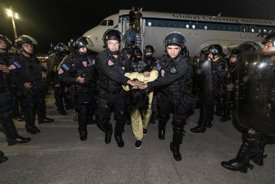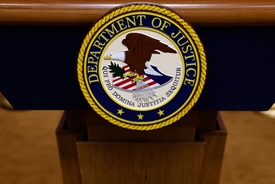The Trump administration has relaxed the controversial requirements needed to be met to place unaccompanied migrant children in the custody of sponsors.
It was announced on Tuesday that background checks from every member of a sponsor's household will no longer be needed.
In June, it was declared that everyone living in a residence where a child might be housed would be asked to submit fingerprints in order to run them against FBI criminal background databases.

However, immigration experts warned that stricter background checks would likely stop sponsors from coming forward to take children in, due to fear of having their information shared with the Immigration and Customs Enforcement authorities.
ICE officials claimed that, as of December 11, federal authorities have arrested 170 immigrants who came forward to sponsor migrant children.
The new ruling is expected to significantly speed up the time it takes for a migrant child to be taken in by a sponsor.
According to a report from National Public Radio, the Trump administration was holding nearly 15,000 children in 137 shelters as of last week.
Most of these minors are labelled as "unaccompanied alien children", this meaning that they crossed the US border without any parents or legal guardians.

According to an HHS fact sheet, the largest shelter, a "tent city" in Tornillo, Texas, held 2,800 unaccompanied minors between 13 and 17.
Approximately 79 per cent of these children were male and 21 per cent female, with most spending, on average, 33 days at Tornillo before being released to a suitable sponsor, the report states.
However, despite the intense background checks sponsors were forced to go through, a government watchdog found that HHS was not conducting required FBI fingerprint background checks of workers at the site.
Before the announcement on Tuesday, doubt had also been cast on whether the Tornillo site had enough staff clinicians to "provide adequate mental health care" for the unaccompanied children.

Overall, more than 49,000 children crossed the border during the 2018 budget year alone. While the total number of children coming to the US is reportedly down from a high in 2016, children are remaining in shelters longer and the total number of minors detained at once is at an all-time high.
U.S. Health and Human Services officials have stated that fingerprints will still be required for sponsors and that these will be cross-checked with the FBI databases and U.S. Department of Homeland Security arrest records.
In addition, the Office of Refugee Resettlement, the agency that manages the children, will still do public-records checks on all adult household members and fingerprints for those adults will still be required in certain circumstances.
These include if the records check uncovers factors like a history of child abuse or a documented safety risk for the child.




